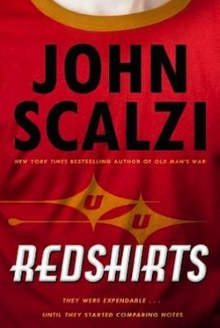
John Scalzi is pretty prominent in science-fiction circles currently and it wasn’t so long ago that he made his debut with the Old Man’s War series which I haven’t read yet. A big part of it is due to his holding the post of president Science Fiction and Fantasy Writers of America and taking a strong stand on feminist issues and against Gamergate and related alt-right controversies. This particular novel won the Hugo Award in 2013 which brought it to my attention then. But the premise seems so obvious that it’s a wonder no one wrote this novel before this.
Ensign Andrew Dahl, an expert in xenobiology is assigned to the Intrepid, the flagship of the Universal Union along a few other new crewmembers. Andrew and his friends soon discover that things are very strange on the ship. All of the more experienced crew members go to great lengths to avoid interacting with the bridge officers and following a disastrous away mission, they notice that the fatalities among the crew are unusually high. Other strange phenomena include the bridge officers having very abrupt changes in behavior and a mysterious box that seemingly solves any technical problem during a crisis. The only person who knows what is going on is Jenkins, a computer expert who has turned into a stowaway on the ship. After going to some lengths to track him down, Andrew learns the truth: not only are they all part of a television show and so are bound by the Narrative, but it is a badly written show to boot. Since only the stars of the show are guaranteed to survive, Andrew realizes that he and his friends will eventually be sacrificed to the Narrative unless he finds some way to fight against it.
As is obvious, the whole thing is a parody of Star Trek and it’s every bit as great and at the same time as cringe-worthy as this description implies. Even as I’m amazed that no one has written this before I do have to admit that Scalzi takes the concept way, way further than I ever expected. Maybe too far as it becomes so meta that it feels like crack fiction on the Internet. It’s great for Star Trek fans as it mocks all of the awful tropes you’ve always hated, silly exploding consoles on the bridge during battles for example or how a particular character keeps suffering all manner of injuries and weird afflictions but always recovers. It’s also great in that Andrew and his friends are intelligent characters who do the research. Once they realize what is going on, they go about trying to understand it and find a solution in a systematic manner. This even applies to the other crew members who just want to survive and develop behaviors akin to superstitions as a natural response. I really appreciate how Scalzi has exhaustively thought through everything.
I was disappointed in that the writing is workman-like and unambitious, the kind of prose that is only interested in progressing the plot as efficiently as possible with few artistic flourishes or wow factor. If this holds true for the rest of Scalzi’s work I’m not sure that I’ll enjoy them very much. The novel has very little going for it aside from its plot as the characters aren’t very interesting and it’s somewhat weird that they’re almost completely unaffected by existential angst after discovering the strange nature of their reality. Perhaps because the main plot doesn’t take very long to be resolved, there are a number of epilogues that are frankly amateurish and sentimental. It’s especially disappointing that all of the epilogue stories are about present day Earth when it would have been more interesting to see how the future universe, and in particular the lives of the bridge officers, have changed once they have been freed from the Narrative.
I did enjoy the book and I have to confess that I was completely engrossed in it right up to the end because I wanted to know what happens next. In that sense, Scalzi is a great storyteller. Plus as I noted this is a science-fiction book that really did need to be written. At the same time, I dislike that this is enough to be considered the best science-fiction novel of the year. It’s like the genre as a whole isn’t trying hard enough. There are no big ideas here and this is hardly fare that will stir the emotions. It’s just, well, acceptably average.